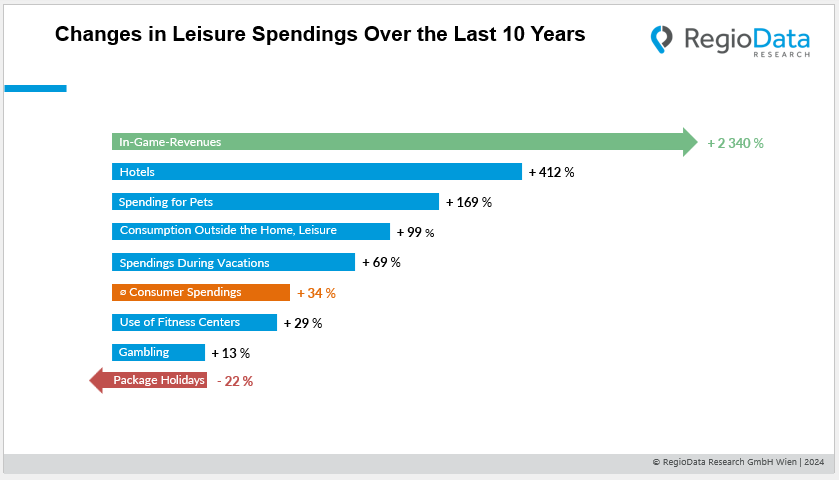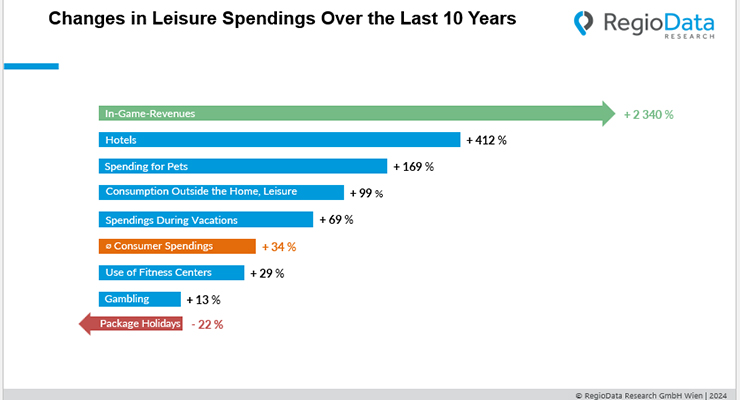By Romina Jenei, CEO of RegioPlan Consulting
In comparison to international standards Austrian shopping malls still have a relatively small proportion of their space dedicated to gastronomy, about 6%. It is expected that this will increase to around 10% over the next five years. These developments are relevant for retailers, operators, and investors, who need to understand these economic trends and consumer habits to make informed decisions and sustainable investments.
The Increasing Value of Experiences
Since 2019, spending on leisure activities in Austria has noticeably changed, especially in the areas of entertainment and leisure. Consumers increasingly value quality experiences, which is reflected in a significant rise in so-called “fun expenditures.” Over the past ten years, these expenditures have increased by 80%, particularly in the gastronomy sector, where spendings per person rose from 700 euros in 2013 to 1,500 euros in 2023, according to the latest RegioData Research Consumer Expenditures Report. These figures illustrate that despite economic uncertainties and societal changes like the pandemic, the demand for dining experiences has surged.
Alongside the rise in fun expenditures, consumption behavior has also significantly shifted. Spending on digital content and experiences has grown from negligible amounts to significant sums, indicating a shift in consumer interest toward digital and interactive formats. These developments are crucial for retailers and service providers who must adapt their offerings to remain competitive in a rapidly changing market.

Austria´s Increase in Purchasing Power by 2025
Despite some setbacks in purchasing power, the data for 2024 shows a recovery, with a return to pre-Corona levels by the end of the year and an expected increase in purchasing power by 2025. Compared to the statistics of 2019 the real purchasing power in Austria is expected to see an increase of nearly 100% by 2025.* It is anticipated that spending on leisure activities will significantly rise in the coming years, particularly in gastronomy and digital entertainment. Spending on dining experiences has already doubled, and this trend is expected to continue.
The Resilience of the Leisure Sector
In summary, leisure spending in Austria has significantly increased, especially in the areas of gastronomy and digital entertainment. This trend indicates a shift in consumption habits away from physical products towards experiences and emotions. Despite economic fluctuations, the leisure sector remains dynamic but robust and growing, demonstrating strong resilience and adaptability. Retailers, service providers, as well as real estate operators and developers need to be creative and bold to remain competitive in this rapidly changing market. It is crucial to integrate the ‘fun factor’ into business models, as entertainment is becoming increasingly decisive in purchasing decisions. Adapting to digital trends and creating high-quality experiences can help boost customer demand and ensure long-term success. Understanding these changes and responding proactively is essential for long-term success.
Impact on the Industry
With the increase in spending on leisure activities, the demand for suitable properties for restaurants, bars, entertainment parks and other leisure facilities is rising. Additionally, there is growing interest in properties that combine multiple functions, such as residential, commercial, and leisure areas. These mixed-use properties are becoming more attractive as they reflect the trend toward quality experiences and comfort.
Areas with a high concentration of leisure offerings are booming with increased footfall which may also lead to rising property prices in these locations. Investors and developers are increasingly focusing on such hotspots. As digital content and experiences gain importance, real estate operators and developers must invest in the necessary infrastructure, such as good internet connectivity and modern technical equipment. The real estate sector must also adapt to economic fluctuations and changing consumer needs. This means enabling more flexible use of properties and developing innovative concepts that integrate the ‘fun factor’.
However, space for leisure activities is, as well as gastronomy, not a cure for sick retail zones. If it is implemented wisely concerning dimension and target group it can increase footfall and the overall attractivity of meeting places. Largely, the real estate sector requires strategic adaptation to these new consumption habits to remain competitive and successful in the long term.







